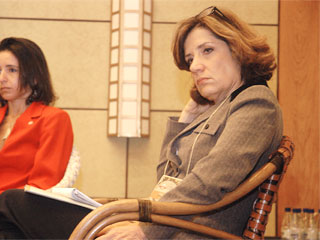Pact against forced labor will separate the wheat from the chaff
Retail sector joins the fight so that no one will be subject to inhumane work conditions anymore
The National Pact for the Elimination of Forced Labor, which celebrated its second anniversary this May 19th, was the topic of the theme panel "Policies to fight forced labor: challenges for their implementation". The debate, held at the Instituto Ethos’ 2007 Conference, featured the indignant comments of Miriam Leitão, columnist of O Globo newspaper, commentator of CBN radio station. "This pact’s made me realize the worst thing we have in Brazil; we’ve got to do away with this shame." Miriam assured she will bother whoever she needs to in order to play her full part in this process. "I want, as a consumer, to make sure the meat I’m eating is forced labor-free. Each one of us needs to know what we’re endorsing". She said she was sorry that the Brazilian press, which has learned to demand action from the government, still does not know how to make demands on the companies.
Miriam Leitão’s indignation is justifiable. In 2005, 4,133 people who were working without freedom and living in inhumane conditions were rescued by the Ministry of Labor, especially in the states of Pará, Maranhão, Mato Grosso and Tocantins. The statistics have been similar along the years. Many of these workers have been coerced into remaining in the lands where they worked, for they believed they owed money to their employers. Alternatively, they could not cover the long distances of the farms when trying to make their escape, usually prevented by force. Many people continue to live under these conditions, mainly in farms or charcoal plants throughout the country.
The National Pact for the Elimination of Forced Labor, launched in 2005 by Instituto Ethos, in partnership with the International Labour Organisation (ILO) and the NGO Repórter Brasil, will have novelties this year. All the signatory companies and entities (totaling over 80) – mostly from the oil & gas, siderurgy, and retail sectors – will be subjected to a continuous monitoring process, so that the society can know what they are actually doing to fight forced labor in the country. "This process will allow us to separate the wheat from the chaff," said Patrícia Audi, coordinator of the Project for Eradicating Forced Labor at the ILO in Brazil. The process will be led by the ILO, in partnership with the Social Observatory.
Audi stressed that Brazil was the first country in the world to publicly acknowledge this problem. The Pact has published the Forced Labor Blacklist, which consists of a list, monitored by the Ministry of Labor, naming 160 farms – 0.03% of the total rural properties – accused of imposing forced labor. The National Confederation of Agriculture (CNA), for example, which could be an important ally in fighting the problem, denies the existence of forced labor in the country and criticizes the Blacklist. The list, which reached 183 companies, is currently shorter, because many of them entered preliminary injunctions in court to have their names withdrawn from the list. The companies included in the Backlist certainly lose money, for many customers do no longer want them as suppliers.
In the last few days, thanks to the pressure exerted by the Wal-Mart Group, a Pact signatory, three cold-storage plants agreed to sign it. "Wal-Mart set a good example by saying it would no longer buy meat from theses companies if they did not sign the public commitment," celebrated Audi. This is an example of how the commercial side can help solve the social problem created by the forced labor.
Audi believes only after the implementation of coercion, reinsertion and prevention will it be possible to eliminate forced labor in Brazil. In its latest meeting, the Pact decided to create a permanent Work Group among signatory companies to discuss and diffuse the theme. The retail sector, through Wal-Mart, Carrefour, and Pão de Açúcar supermarket chains, committed itself not to buy products from suppliers connected in any way with forced labor.
Fonte: Instituto Ethos

> Petrobras Watch the Petrobras coverage
© Copyright 2007, Instituto Ethos de Responsabilidade Social Empresarial. Todos os direitos reservados






